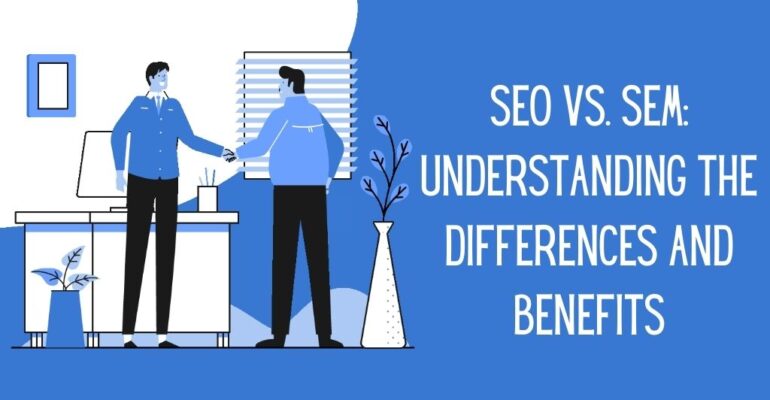In this article, we aim to provide you with an in-depth understanding of the differences and benefits of Search Engine Optimization (SEO) and Search Engine Marketing (SEM). Our goal is to equip you with the knowledge to optimize your online presence effectively and outrank your competitors on Google.
In the vast digital landscape, visibility is key to success. Whether you’re running an e-commerce store, a blog, or a corporate website, the battle for online supremacy begins with mastering SEO and SEM. These two digital marketing strategies play a pivotal role in determining your website’s ranking on Google, which directly impacts your traffic, leads, and ultimately, your revenue.
SEO: Unraveling the Power of Organic Search
Search Engine Optimization, commonly known as SEO, is the art and science of optimizing your website to rank higher on search engine result pages (SERPs) organically. Unlike paid advertisements, SEO relies on enhancing various elements of your website and creating valuable, relevant content to attract visitors naturally.
On-Page SEO
On-page SEO involves optimizing the individual pages of your website to make them more search engine-friendly. This includes optimizing meta tags, headings, and URL structures, as well as incorporating targeted keywords throughout the content.
Off-Page SEO
Off-page SEO revolves around building high-quality backlinks and establishing your website’s authority through various external channels. This involves blog posting, local listings, and other link-building strategies.
The Benefits of SEO
Sustainable Traffic: With proper optimization, your website can enjoy a steady stream of organic traffic, even after the initial effort.
Credibility and Trust: Websites that rank high on search engines are perceived as more trustworthy and credible by users.
Cost-Effectiveness: Organic traffic obtained through SEO is essentially free, making it a cost-effective long-term strategy.
User Experience: SEO often goes hand in hand with improved user experience, leading to higher engagement and lower bounce rates.
Local SEO: For businesses targeting local audiences, local SEO tactics can drive foot traffic to brick-and-mortar stores.
SEM: The Power of Paid Advertising
Search Engine Marketing, or SEM, involves using paid advertising to boost your website’s visibility on search engine result pages. This method enables you to bid on keywords and have your ads displayed above organic search results, marked as “sponsored” or “ad.”
Google Ads (formerly AdWords)
Google Ads is the most popular SEM platform, allowing businesses to create targeted ads based on specific keywords and demographics.
Display Ads
Display ads are image-based advertisements that appear on various websites within Google’s Display Network.
The Benefits of SEM
Immediate Visibility: Unlike SEO, which takes time to yield results, SEM provides instant visibility and traffic to your website.
Precise Targeting: With SEM, you can precisely target your audience based on their search queries and demographics.
Flexible Budgeting: SEM allows you to set your budget and control your ad spend based on your marketing goals.
Measurable Results: With detailed analytics, you can track the performance of your SEM campaigns and optimize accordingly.
Complements SEO: SEM can work in conjunction with SEO to dominate the search engine result pages, covering both organic and paid listings.
Combining SEO and SEM for Maximum Impact
1. Keyword Synergy
By analyzing data from your SEM campaigns, you can identify high-performing keywords that convert well. Implementing these keywords in your SEO strategy can enhance your organic rankings and drive more targeted traffic to your site.
2. Amplified Brand Visibility
By occupying both organic and paid positions on SERPs, your brand gains more visibility, instilling trust and authority among potential customers.
3. Testing Grounds
SEM provides a valuable testing ground for your SEO strategy. Before investing time and resources in optimizing your website for a particular keyword, you can test its performance through SEM campaigns.
4. Remarketing Opportunities
Through SEM, you can capture user data and retarget potential customers with personalized ads, making your marketing efforts more effective.
Remember, search engine algorithms are constantly evolving, and staying ahead requires continuous monitoring and adaptation. By aligning your SEO and SEM efforts, you can create a formidable online presence that dominates the search engine result pages.
FAQs
1. What is the main difference between SEO and SEM?
Answer: The main difference between SEO and SEM lies in their approach to obtaining visibility on search engine result pages (SERPs). SEO focuses on organic methods, optimizing websites and creating valuable content to rank naturally. On the other hand, SEM involves paid advertising, where businesses bid on keywords to display their ads above organic results.
2. Which strategy provides faster results, SEO or SEM?
Answer: SEM typically provides faster results compared to SEO. With SEM, your ads can be displayed immediately after setting up campaigns, driving traffic to your website instantly. In contrast, SEO takes time to build authority and climb organic rankings, making it a more long-term strategy.
3. Can SEO and SEM be used together?
Answer: Absolutely! In fact, using SEO and SEM together can be a powerful combination. By utilizing both strategies, you can maximize your online presence by occupying both organic and paid positions on SERPs. Additionally, data from SEM campaigns can inform your SEO keyword strategy, enhancing overall performance.
4. Are there any risks associated with SEM?
Answer: While SEM can yield quick results, it does come with potential risks, especially if not managed properly. Bidding on highly competitive keywords can lead to higher costs and lower returns on investment. Additionally, poorly optimized ads may result in low click-through rates and wasted ad spend.
5. Which strategy is more cost-effective in the long run?
Answer: SEO is generally considered more cost-effective in the long run. Once your website achieves higher organic rankings, you can enjoy a steady stream of traffic without ongoing ads spend. While SEO requires upfront investment in content creation and optimization, it becomes a sustainable traffic source over time.

